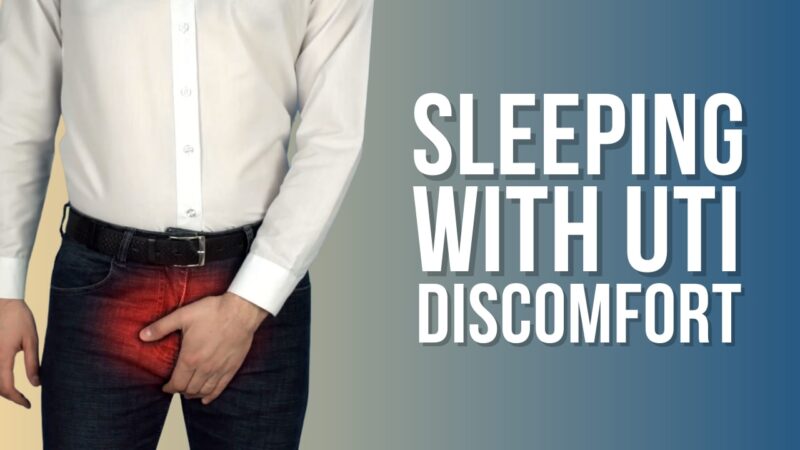Does it hurt when you pee or while you’re trying to sleep? If the answer is yes, then it’s worth exploring the world of Urinary Tract Infections, or UTIs. A common health issue that occurs when bacteria infiltrate your urinary tract, which includes your kidneys, bladder, and urethra.
UTIs are far from being a rare condition. In fact, millions of people around the globe suffer from UTIs every year. Given the uncomfortable symptoms that accompany the infection, these infections can significantly impact one’s sleep patterns, turning what should be a restful night into a restless ordeal.
Addressing UTI discomfort is critical not only for the health of your urinary tract but also for the quality of your sleep. A night of interrupted sleep due to discomfort can affect your overall well-being and daily functioning, emphasizing the importance of effective UTI management for better sleep quality.
Understanding UTI Discomfort
The discomfort that comes with UTIs can be attributed to its symptoms, which are unfortunately not very pleasant. The typical signs include a burning sensation during urination, lower abdominal pain, frequent urge to urinate, cloudy or strong-smelling urine, and in some cases, fever.
Sleeping with a UTI can be a challenging task. Many factors can exacerbate the discomfort during sleep, such as the position in which you sleep, or a state of dehydration which can increase the concentration of your urine and thereby, intensify your symptoms.
The interplay between UTIs and disrupted sleep patterns forms a vicious cycle that’s worth understanding. The discomfort from these symptoms can lead to fragmented sleep, and poor sleep, in turn, can potentially weaken your immune system, making it harder for your body to fight off the infection.
Preparing for Bedtime

Hydration plays a crucial role in the management of UTIs. Drinking plenty of water helps dilute your urine and ensures that you urinate more frequently, flushing bacteria out of your urinary tract.
However, while it’s important to stay hydrated throughout the day, it’s recommended to moderate your fluid intake close to bedtime to prevent frequent night-time urination from disrupting your sleep.
Before you get under the covers, it’s also worth avoiding known bladder irritants. Consuming substances like caffeine, alcohol, and spicy foods can exacerbate symptoms, making it harder for you to have a good night’s rest.
Finally, one good habit to inculcate is to empty your bladder completely before heading to bed. This simple practice can help reduce the bacteria present in your urinary tract and help alleviate discomfort throughout the night.
Creating a Comfortable Sleep Environment
A comfortable sleep environment can go a long way in managing discomfort.
- The first step involves picking the right bedding and sleepwear. Loose, breathable cotton clothes and sheets can help prevent overheating and excessive sweating, which might otherwise aggravate UTI discomfort.
- Maintaining an optimal room temperature is another aspect worth your attention. The recommended temperature for promoting good sleep lies between 60-67°F or 15-19°C. A room that’s too hot or too cold can disrupt your sleep and add to your discomfort.
- Lastly, try to minimize disruptions caused by noise and light as much as possible. Unwanted sounds and lights can contribute to broken sleep. Using earplugs, eye masks, or even white noise machines might help create a more conducive environment for restful sleep.
Natural Remedies

When it comes to natural remedies for UTI discomfort, cranberries often top the list. Drinking cranberry juice or using cranberry supplements might help prevent bacteria from adhering to the walls of your urinary tract. Although more research is needed to confirm this, many people report finding relief through this natural remedy.
Herbal teas also hold a place in the arsenal of natural remedies. Oils and teas like chamomile or peppermint have soothing effects and can help you relax before bedtime, thereby promoting better sleep.
Probiotics, the ‘good’ bacteria that can help maintain a healthy balance in your body, can also be beneficial. Incorporating probiotics into your diet, through foods like yogurt and kefir or through supplements, can potentially help in preventing UTIs.
Over-the-Counter Medications
When natural remedies don’t quite cut it, you can consider over-the-counter (OTC) medications. Pain relievers like acetaminophen or ibuprofen can help manage the pain and discomfort, making it easier for you to get through the day and sleep better at night.
There are also OTC medicines specifically designed for UTI relief, such as phenazopyridine. These can provide temporary relief from symptoms. However, remember that while these medicines can offer symptom relief, they do not treat the underlying bacterial infection that causes UTIs.
Medical Interventions

For cases that are more severe or not improving with self-care, medical interventions become necessary. Antibiotics are typically the go-to treatment for UTIs as they directly target and kill the bacteria causing the infection, thereby helping you recover more quickly.
That being said, it’s crucial to consult with a healthcare professional before starting any antibiotic treatment. The type of antibiotic prescribed, as well as the duration of the treatment, can vary based on your symptoms, health history, and the specific bacteria causing your UTI. A healthcare professional can provide the best personalized advice for your situation.
Hygiene and Prevention
Hygiene and prevention strategies can also play a significant role in managing UTI discomfort and reducing the risk of future UTIs. Maintaining proper genital hygiene is vital to prevent bacterial spread. This includes cleaning your genital area before and after sexual activity and always wiping from front to back to prevent bacteria from the anal area from reaching the urinary tract.
Urinating immediately after sexual activity, avoiding potentially irritating feminine products, and not holding in urine for too long are other preventative strategies worth implementing. By maintaining good urinary habits and hygiene, you can reduce the irritation and frequency of UTIs, thus better managing the discomfort and ensuring better sleep quality.
Managing Stress and Anxiety

Often overlooked but equally important is the management of stress and anxiety. Stress and anxiety can exacerbate symptoms by impacting your immune system’s effectiveness, making it harder for your body to fight off the infection.
Employing relaxation techniques, like deep breathing exercises, meditation, or yoga, can aid in stress management, contributing to better UTI management. These techniques can also improve your sleep quality, reinforcing the cyclical relationship between good sleep, stress management, and better handling of symptoms.
When to Seek Medical Attention
While UTIs are typically straightforward to manage, there are instances when medical attention becomes essential. Recognizing severe symptoms is the first step. These might include high fever, severe pain in the lower abdomen or back, blood in the urine, or symptoms that persist or worsen despite initial treatment.
Beyond just discomfort, untreated UTIs can lead to potential complications such as kidney infections, which are more serious and can cause permanent damage. Pregnant women, in particular, need to be extra cautious, as UTIs can potentially lead to premature birth or low birth weight if not treated properly.

FAQ
How common are UTIs?
Incredibly common, with around half of all women experiencing at least one UTI in their lifetime.
Can men get UTIs too?
Yes, while more common in women due to their shorter urethra, men can also get UTIs, especially as they age.
What’s the most common cause of UTIs?
Most are caused by the bacteria E.coli, which normally live in the intestines.
Are UTIs contagious?
No, they are not contagious and cannot be transmitted from person to person through sexual contact.
Can UTIs go away on their own?
Mild UTIs can sometimes resolve on their own without treatment, but it’s generally recommended to treat them with antibiotics to prevent complications.
What increases my risk of getting a UTI?
Factors like sexual activity, menopause, urinary tract abnormalities, blockages in the urinary tract, and a suppressed immune system can increase the risk.
Can UTIs affect pregnancy?
Yes, UTIs can cause complications during pregnancy, including low birth weight and premature birth.
Can UTIs be prevented?
Yes, good hygiene practices, proper hydration, urinating after sexual activity, and avoiding irritants like douches and powders can help prevent UTIs.
Can UTIs recur?
Yes, recurrent UTIs, defined as two or more infections in six months, or three or more in a year, are common in some individuals.
Can UTIs cause other complications if left untreated?
Yes, untreated UTIs can potentially lead to serious complications like kidney infections and sepsis, which is why timely treatment is crucial.
Conclusion
Addressing UTI discomfort is not just about the alleviation of immediate symptoms. It is a vital step towards ensuring quality sleep and overall well-being. Poor sleep can compromise your immune system, reducing your body’s ability to fight off infections, while a well-managed UTI can pave the way for better sleep quality.
Managing discomfort for better sleep involves understanding symptoms, creating a comfortable sleep environment, exploring natural remedies and OTC medications, staying hydrated, and maintaining good urinary hygiene.
Seek medical intervention when symptoms are severe or persist despite self-care. Finally, remember that managing stress and anxiety is an integral part of both UTI management and achieving quality sleep.

